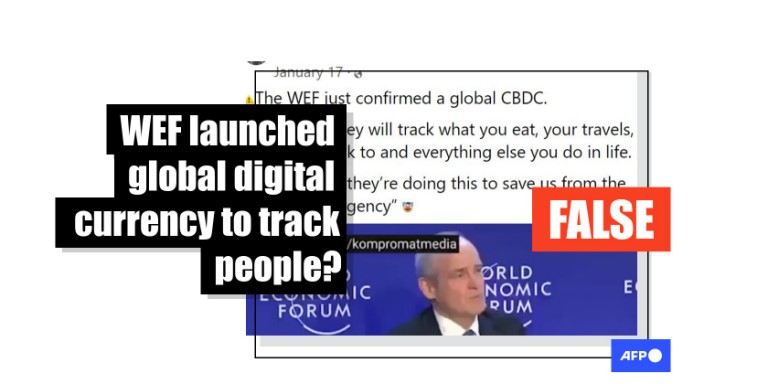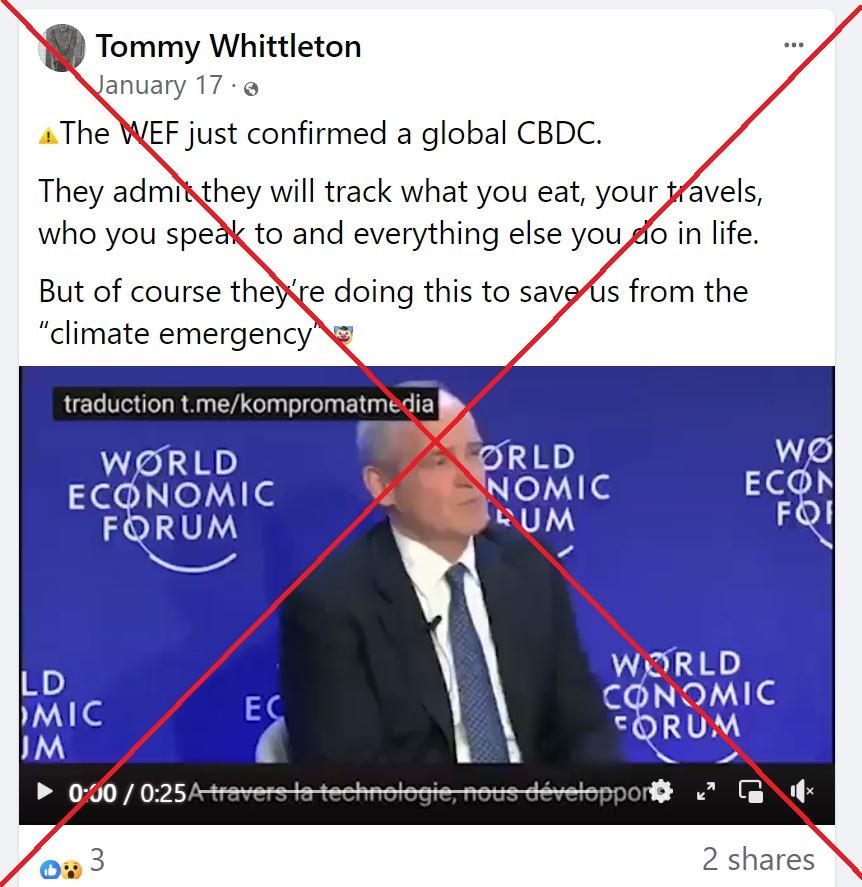
World Economic Forum did not launch 'global digital currency'
- This article is more than two years old.
- Published on February 27, 2024 at 05:30
- Updated on February 27, 2024 at 08:01
- 2 min read
- By Kate TAN, AFP Australia
"The WEF just confirmed a global CBDC," reads a Facebook post shared on January 17.
A central bank digital currency (CBDC) is the digital form of a country's official currency.
Most cryptocurrencies are decentralised and offer anonymity of transactions, while a central bank digital currency is centralised and regulated and the parties to transactions are known.
According to the Atlantic Council think tank, 11 countries have fully launched a CBDC. China is trying out its own digital currency in a pilot programme, while European Central Bank is preparing a potential digital euro (archived here and here).
Misinformation has swirled around the rise in CBDCs, including suggestions they are a ploy to stop consumers accessing cash.

The Facebook post adds: "They admit they will track what you eat, your travels, who you speak to and everything else you do in life."
"But of course they're doing this to save us from the 'climate emergency'".
Some social media users appeared to believe the video genuinely showed the WEF confirming the launch of a global digital currency.
"Nobody has voted for this!" a comment read.
"Nobody wants to buy into their plan. They will have to force it and that will be violent," another wrote.
The false claim appeared to originate from an X post by US-based blogger Layah Heilpern, who has more than 600,000 followers on the platform.
However, the video shows the president of Chinese e-commerce firm Alibaba -- not a WEF representative -- announcing the development of a carbon footprint tracking technology, not a CBDC.
Carbon emissions tracker
A search of keywords from the speech led to various reports from May 2022 about Alibaba Group president Michael Evans speaking at the WEF's annual meeting in Davos, Switzerland (archived link).
Evans is indeed listed on an official programme as a speaker on a panel on responsible consumption on May 24, 2022 (archived link).
A video on the WEF's YouTube channel shows Evans at the event, with the clip shared on social media seen from the 29:39 timestamp (archived link).
The panel's moderator Jane Nelson, director of the Corporate Responsibility Initiative at Harvard Kennedy School, asked Evans about initiatives to tackle carbon emissions.
Evans responded: "We're developing through technology an ability for consumers to measure their own carbon footprint."
"What does that mean? That's where are they travelling, how are they travelling, what are they eating, what are they consuming on the platform? So, individual carbon footprint tracker," he said.
"Stay tuned, we don't have it operational yet but this is something that we're working on."
Alibaba launched its carbon footprint tracker in August 2022 (archived link).
According to the company's website, it allows consumers to earn shopping discount points on Alibaba's e-commerce platforms for making "low-carbon choices", such as buying energy-efficient appliances.
Meanwhile, a World Economic Forum representative refuted the claim it was launching a global central bank digital currency.
"This claim is completely made up to fuel absolute baseless conspiracy theories in order to discredit the important work that the World Economic Forum does on serious global challenges," the spokesperson told AFP on February 19.
The WEF is regularly targeted by outlandish misinformation, including that it promoted paedophilia, called for the slaughter of pet cats and dog, and said babies should all be "lab-grown" by 2030.
Removed quotation marks in second line of first paragraphFebruary 27, 2024 Removed quotation marks in second line of first paragraph
Copyright © AFP 2017-2026. Any commercial use of this content requires a subscription. Click here to find out more.
Is there content that you would like AFP to fact-check? Get in touch.
Contact us
